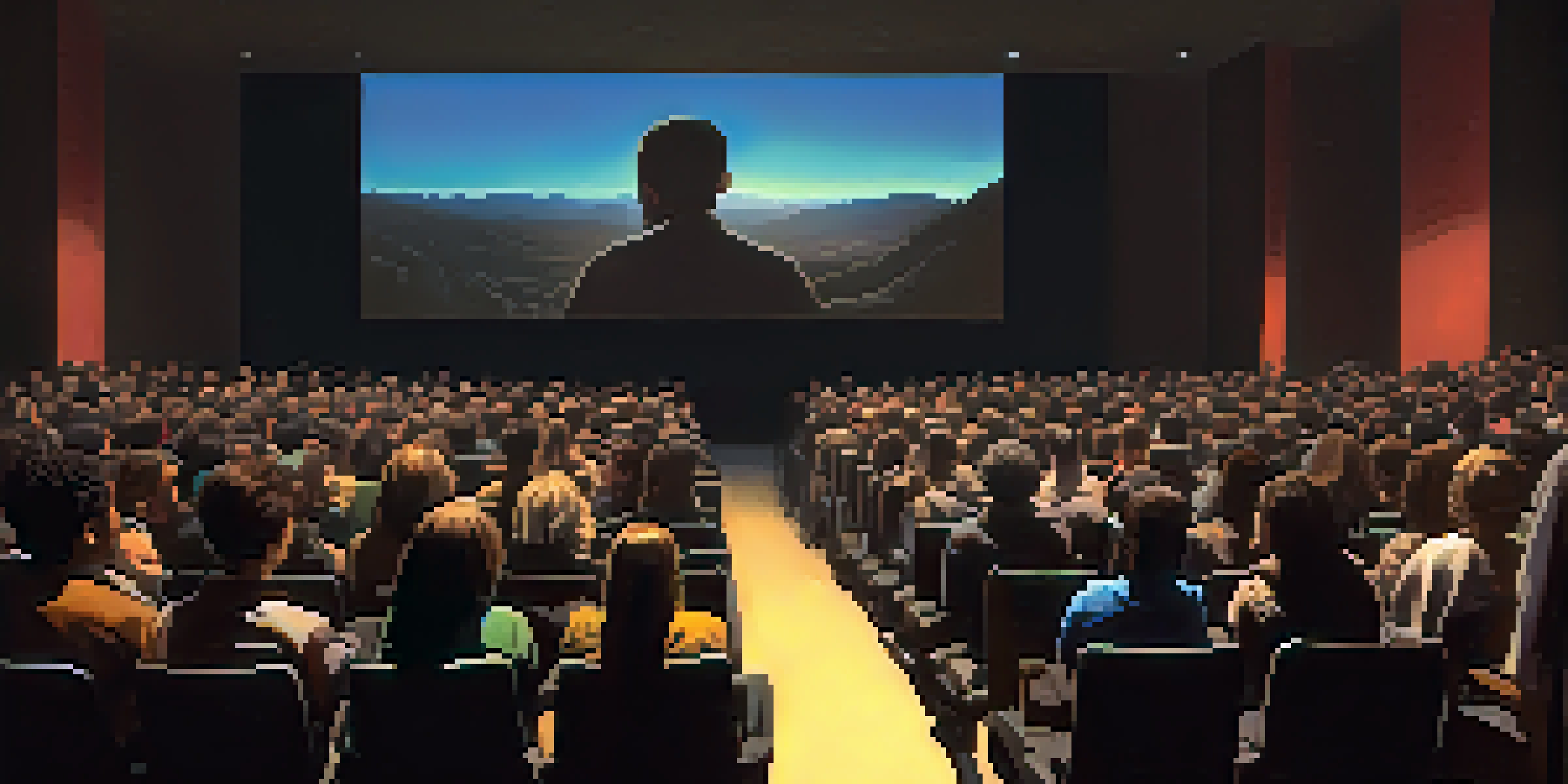Impact of Documentaries on Social Movements in America

Understanding the Role of Documentaries in Society
Documentaries serve as a powerful medium for storytelling, shedding light on issues that might otherwise remain hidden. They provide viewers with a window into the experiences and struggles of others, fostering empathy and understanding. By presenting factual narratives, documentaries can influence public perception and inspire action, playing a pivotal role in social change.
Documentaries are a powerful way to bring the stories of real people to a wider audience, helping to illuminate issues of social justice and humanity.
The impact of documentaries often extends beyond mere entertainment; they educate and inform audiences about critical social issues. For instance, documentaries like '13th' have sparked conversations about systemic racism and mass incarceration. This educational aspect is crucial, as it equips viewers with the knowledge necessary to engage in meaningful discussions and advocacy.
Moreover, documentaries can serve as historical records, preserving important narratives for future generations. They capture the essence of social movements, documenting the voices and events that shape society. In this way, documentaries not only influence current perceptions but also create a legacy of awareness and activism.
How Documentaries Spark Awareness and Empathy
One of the most significant impacts of documentaries is their ability to raise awareness about social injustices. By highlighting real-life stories, they draw attention to issues that may be overlooked by mainstream media. For example, 'Blackfish' brought the plight of orcas in captivity into the spotlight, leading to widespread public outcry and change in policies.

Empathy plays a crucial role in social movements, and documentaries excel at fostering this connection. When viewers see the struggles of others portrayed authentically on screen, it can evoke a strong emotional response. This emotional engagement often motivates individuals to take action, whether through activism, donations, or spreading the word.
Documentaries Foster Empathy
By showcasing real-life stories, documentaries create emotional connections that inspire viewers to engage with social issues.
As viewers become more aware and empathetic, they may feel compelled to join movements or support causes. Documentaries can serve as catalysts for change, transforming passive viewers into active participants. This ripple effect can have profound implications for social movements seeking to mobilize support and drive change.
The Role of Documentaries in Mobilizing Activism
Documentaries often serve as rallying cries for activists, providing a clear narrative that can galvanize support. They can illustrate the urgency of a cause, encouraging viewers to get involved. For instance, 'Won't You Be My Neighbor?' reignited interest in Fred Rogers' message of kindness, inspiring many to advocate for compassion in their communities.
The power of a documentary is its ability to evoke empathy and inspire change through real-life stories.
Moreover, documentaries can equip activists with the tools they need to further their causes. By showcasing successful strategies and highlighting key figures within movements, they offer valuable insights. This knowledge can empower viewers to take initiative, leading to more organized and effective activism.
Social media has amplified the reach of documentaries, allowing movements to spread awareness rapidly. Activists can share documentary clips or host screenings to engage their communities. This synergy between documentary storytelling and social media has become a powerful force in mobilizing support for various causes.
Case Study: 'The Act of Killing' and its Impact
'The Act of Killing' is a compelling example of how documentaries can influence social movements. This film challenges former Indonesian death squad leaders to reenact their real-life killings, prompting a global conversation about human rights and historical accountability. Its unique approach not only sheds light on past atrocities but also encourages dialogue about justice and reconciliation.
The documentary sparked discussions around the world, leading to increased awareness of the Indonesian genocide. Activists utilized the film to advocate for human rights and seek justice for victims' families. The emotional weight of the film resonated deeply with audiences, motivating many to support related causes.
Catalysts for Activism
Documentaries often serve as rallying cries, galvanizing support and providing insights that empower individuals to take action.
This case study illustrates the potential of documentaries not just to inform but also to inspire action. By exposing uncomfortable truths, 'The Act of Killing' helped mobilize a generation of activists to demand accountability and change, showcasing the profound impact that a single documentary can have on social movements.
The Power of Personal Narratives in Documentaries
Personal narratives are at the heart of many impactful documentaries, as they humanize complex issues. By following individuals' journeys, filmmakers can create a strong emotional connection with the audience. This connection is essential for fostering empathy and understanding, which are vital for any social movement.
Take, for example, 'The Hunting Ground,' which tells the stories of sexual assault survivors on college campuses. By sharing their experiences, the film highlights a pervasive issue and encourages viewers to engage in discussions about consent and accountability. Such personal storytelling can resonate deeply, inspiring viewers to take a stand.
These personal stories not only inform but also empower others to share their experiences. When individuals see their struggles reflected on screen, it can validate their feelings and encourage them to speak out. This collective sharing of narratives can build a sense of community, strengthening social movements and inspiring further activism.
Challenges and Critiques of Documentaries in Advocacy
Despite their many strengths, documentaries are not without challenges and critiques. Some argue that they may oversimplify complex issues or present biased perspectives. This can lead to misrepresentation, where the nuances of a situation are lost in the storytelling process.
Additionally, the emotional impact of documentaries can sometimes overshadow the need for critical analysis. Viewers may feel compelled to act based solely on emotional responses rather than a comprehensive understanding of the issues. This highlights the importance of accompanying documentaries with discussions and resources that encourage informed activism.
Challenges in Documentary Advocacy
While powerful, documentaries face critiques regarding oversimplification and funding, which can hinder their impact on social movements.
Moreover, funding and production challenges can impact the quality and reach of a documentary. Independent filmmakers often face financial constraints that can limit their ability to distribute their work effectively. As a result, important stories may not reach the audiences that need to hear them most, posing a challenge for social movements reliant on documentary support.
The Future of Documentaries and Social Movements
As technology evolves, so does the landscape of documentary filmmaking. Digital platforms and streaming services have made it easier for independent filmmakers to share their work with global audiences. This democratization of content allows for a diverse range of voices and stories to emerge, enriching the discourse around social movements.
Interactive documentaries and virtual reality experiences are also on the rise, offering new ways to engage audiences. These innovative formats can create immersive experiences that deepen understanding and empathy. As viewers become more engaged, the potential for documentaries to influence social movements only grows.

Looking ahead, the collaboration between filmmakers and activists will likely continue to strengthen. As social movements leverage the power of documentaries to tell their stories, we can expect to see a more interconnected approach to advocacy. This collaboration holds promise for driving meaningful change in society, ensuring that important narratives are heard and acted upon.